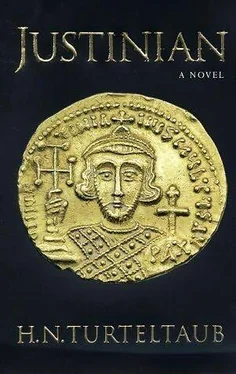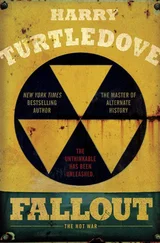Harry Turtledove - Justinian
Здесь есть возможность читать онлайн «Harry Turtledove - Justinian» весь текст электронной книги совершенно бесплатно (целиком полную версию без сокращений). В некоторых случаях можно слушать аудио, скачать через торрент в формате fb2 и присутствует краткое содержание. Жанр: Историческая проза, на английском языке. Описание произведения, (предисловие) а так же отзывы посетителей доступны на портале библиотеки ЛибКат.
- Название:Justinian
- Автор:
- Жанр:
- Год:неизвестен
- ISBN:нет данных
- Рейтинг книги:3 / 5. Голосов: 1
-
Избранное:Добавить в избранное
- Отзывы:
-
Ваша оценка:
- 60
- 1
- 2
- 3
- 4
- 5
Justinian: краткое содержание, описание и аннотация
Предлагаем к чтению аннотацию, описание, краткое содержание или предисловие (зависит от того, что написал сам автор книги «Justinian»). Если вы не нашли необходимую информацию о книге — напишите в комментариях, мы постараемся отыскать её.
Justinian — читать онлайн бесплатно полную книгу (весь текст) целиком
Ниже представлен текст книги, разбитый по страницам. Система сохранения места последней прочитанной страницы, позволяет с удобством читать онлайн бесплатно книгу «Justinian», без необходимости каждый раз заново искать на чём Вы остановились. Поставьте закладку, и сможете в любой момент перейти на страницу, на которой закончили чтение.
Интервал:
Закладка:
Justinian
Harry Turtledove
JUSTINIAN
Is that you, Brother Elpidios? No, wait, don't speak. I know it's you, for I recognize your step. I may have had my eyes burned out, but my ears see for me now. And, as the saying goes, a robe is revealed in advance by its border. So in the same way the stride reveals the man. You should fix the strap on your left sandal. It's loose, and flaps when you walk. Have you got the book with you? Ah, there it goes down on the table. Turn to the first leaf, I pray you. Justinian is gone from men these past twenty years- as long as I've been blind- but not all his deeds were wicked, and many of those that might be reckoned so were on such a scale that they deserve to live in the memories of men, too. I knew he had been working on the tale of his life for years, writing every now and then as he found a few minutes' leisure. When the end came, there at Damatrys, he put it into my hands. I got caught soon enough afterwards, of course, and blinded. I remember how red the irons glowed when they brought them to my eyes. I remember the smell, like the baked white of an egg. They were merciful, in their way. Helias could have struck off my head. He thought about it, Lord knows. Instead, he had me brought here, and his men let me keep the book. Read now, Brother Elpidios. Read. If, one day, you write the chronicle of days gone by of which you've talked so much, let what Justinian did and said have its place there. And if not, that's as God wills. The tale is worth the hearing either way; by God and the Virgin I swear it. What's that? Yes, of course you may ask me questions. By your voice, you're young, and, even if you had my years, there's much here you didn't see, much here you couldn't know. So ask. And if, every now and then, you find me interrupting unasked, I pray you forgive me. For old men will talk, and blind men, too. When I speak back and forth with someone, for that time it's as if I see his face in my mind. I don't know how close the face I see matches the face that is, but for me it must do. So read now, Brother Elpidios. Read.
BOOK A
I am Justinian, Emperor of the Romans. Oh, they stole the throne from me once. They mutilated me. They shipped me off into exile. They thought- fools!- they were done with me. But I came back, and they have paid. How they have paid! And they will go on paying, too, so long as one of them is left alive. The Empire is mine, and I shall keep it.
I was born to rule. I could not have been more than four years old when my father, the fourth Constantine and the fourth generation of the dynasty of Herakleios to rule the Roman Empire, sat me on his knee and said, "Do you know, son, why we named you Justinian?"
"No, Papa," I answered. Up till that moment, I had never imagined my name had been given for a reason. It was just what people called me.
"I will tell you, then," he said. You could hardly see his lips move when he talked, so luxuriant were his beard and mustachios. They say his father, Constans, was hairier yet. I do not know. God never granted that I see my grandfather. Rebels on the western island of Sicily murdered him the year before I was born.
My father resumed: "Do you know who the first Justinian was?"
I shook my head. I had never heard of anyone but me with the name. Now I was jealous, for I thought I had it all to myself.
"He was an Emperor, too," my father told me. "He was a great conqueror and a great lawgiver. If you can be like him when the time comes for you to take the throne, you will make the family proud. That is why we gave you the name: to give you a mark to aim at."
If I said I knew then what he meant, I would be lying. But I already knew there had been a great many Emperors of the Romans, so I asked, "When did this other Justinian live?"
My father muttered under his breath and counted on his fingers. At last, he said, "The first Justinian died forty-five years before your great-great-grandfather won the throne for our line from Phokas the monster, the usurper."
"Good. People will remember me instead," I said, "for he has been dead a very, very long time." I tell this without embarrassment; as I said, I had but four years.
Then my father's mouth opened so wide, I could see not just his lips but his teeth and tongue and the back of his throat as well. He laughed loud enough to make two servants come running in to find out what had happened. He waved them away. When they had gone, he said, "That is not such a long time, son, not as we Romans reckon it. The first Emperor, Augustus, was six hundred years dead when Herakleios beat Phokas: more than six hundred fifty years now."
The number was too big to mean anything to me. I had learned to count to twenty, using my fingers and the toes that peeked out of my sandals under the hem of my tunic to help me along. I did not know what it meant to be a Roman, to live with the memories of all those years cloaked around me.
The next spring, the Arabs came to Constantinople. When I was a boy, I knew old men who said that, when they were young, no one at the Queen of Cities paid the Arabs any mind or had even heard of them. How the Roman Empire wishes that were true today!
Herakleios, my great-great-grandfather, beat back the Persians after years of desperate war and restored to Jerusalem the piece of the True Cross the Magians and fire worshipers had carried away when they conquered the holy city.
God rested on the seventh day. Herakles, I suppose, rested after his twelve labors. Herakleios's labors were greater by far than those of the pagan Greek, but did God who had Himself rested allow my forefather any rest? He did not.
Forth from the desert, from the abomination of the desolation, the Arabs swarmed like locusts. They had always been there, I suppose: tent dwellers, nomads, lizard-eating savages. But in Herakleios's time the heresy preached by their false prophet Mouamet made them all brothers and sent them out a-conquering.
And Herakleios, who had celebrated the return of the holy and life-giving wood to Jerusalem, now had to take it up once more and bring it to Constantinople. For the Roman Empire was weak after decades of war with Persia, and had not the strength to withstand the onslaught of new invaders. Palestine and its holy city were lost, and Syria, and Egypt with Alexandria beside it.
(And if we Romans were weak, the Persians were weaker still, and had fallen into civil strife after their war against us failed. The Arabs conquered them one and all, and they have remained under the rule of the followers of the false prophet until the present. They would have done better to leave us alone.)
The great Herakleios's son, Herakleios Constantine- my great-grandfather- ruled but a few months. He suffered from a sickness of the lungs, poor soul. May God have judged him kindly.
When he died, he left behind a young son, my grandfather Constans. But the great Herakleios's second wife, Martina, sought to raise her son Heraklonas, the half-brother of Herakleios Constantine, to the throne in Constans's place. She and Heraklonas got what usurpers deserve: her tongue was cut out, his nose was cut off, and they were sent into exile on Rhodes.
They stole my throne. They cut off my nose. They exiled me. They treated me as if I, fifth in the line of the great Herakleios, had no proper claim to the throne. How I treated them I shall tell in due course.
To return to my grandfather: in his reign, we Romans fought back against the Arabs in every way we could. We sent out a fleet to reclaim Alexandria by Egypt from them, though it remained in Roman hands only a year before the deniers of Christ took it back, and it has stayed in their possession ever since.
From Egypt, the Arabs swept west toward Carthage and the lands surrounding it, lands the Romans had regained from the Vandals during the reign of the Justinian for whom I was named. That was one of the reasons Constans went to Sicily, where he met his death: he used the island as a base from which to assail the Arabs in their movement against Carthage. And while my grandfather lived, Carthage stayed in Roman hands. How it was lost, again, will be told in its own place.
Читать дальшеИнтервал:
Закладка:
Похожие книги на «Justinian»
Представляем Вашему вниманию похожие книги на «Justinian» списком для выбора. Мы отобрали схожую по названию и смыслу литературу в надежде предоставить читателям больше вариантов отыскать новые, интересные, ещё непрочитанные произведения.
Обсуждение, отзывы о книге «Justinian» и просто собственные мнения читателей. Оставьте ваши комментарии, напишите, что Вы думаете о произведении, его смысле или главных героях. Укажите что конкретно понравилось, а что нет, и почему Вы так считаете.












